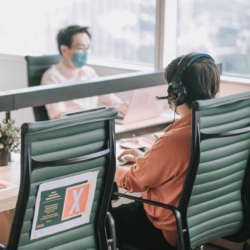To provide the best experiences, we use technologies like cookies to store and/or access device information. Consenting to these technologies will allow us to process data such as browsing behaviour or unique IDs on this site. Not consenting or withdrawing consent, may adversely affect certain features and functions.
The technical storage or access is strictly necessary for the legitimate purpose of enabling the use of a specific service explicitly requested by the subscriber or user, or for the sole purpose of carrying out the transmission of a communication over an electronic communications network.
The technical storage or access is necessary for the legitimate purpose of storing preferences that are not requested by the subscriber or user.
The technical storage or access that is used exclusively for statistical purposes.
The technical storage or access that is used exclusively for anonymous statistical purposes. Without a subpoena, voluntary compliance on the part of your Internet Service Provider, or additional records from a third party, information stored or retrieved for this purpose alone cannot usually be used to identify you.
The technical storage or access is required to create user profiles to send advertising, or to track the user on a website or across several websites for similar marketing purposes.
 Nearly a fifth (17 percent) of CEOs are largely unsuited to the companies they lead, according to new research from academics at Imperial College Business School, Harvard Business School, Columbia University and the London School of Economics. The paper, CEO Behavior and Firm Performance, is based on an analysis of the leadership behaviour of 1,100 CEOs based on their daily schedules. (more…)
Nearly a fifth (17 percent) of CEOs are largely unsuited to the companies they lead, according to new research from academics at Imperial College Business School, Harvard Business School, Columbia University and the London School of Economics. The paper, CEO Behavior and Firm Performance, is based on an analysis of the leadership behaviour of 1,100 CEOs based on their daily schedules. (more…)




































August 4, 2020
Boardroom heroes needed to transform working cultures
by Alex Fleming • Comment, Flexible working